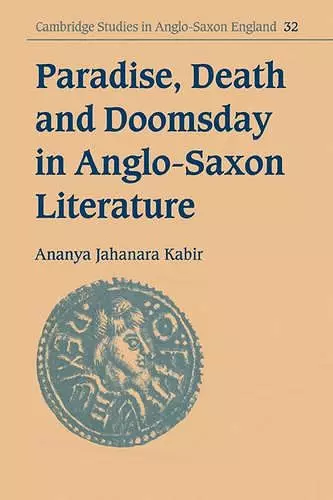Paradise, Death and Doomsday in Anglo-Saxon Literature
Format:Paperback
Publisher:Cambridge University Press
Published:2nd Nov '06
Currently unavailable, and unfortunately no date known when it will be back

A 2001 study of 'interim paradise': the temporary abode of souls after death and before Doomsday.
How did the Anglo-Saxons conceptualize the interim between death and Doomsday? In Paradise, Death and Doomsday in Anglo-Saxon Literature, first published in 2001, Dr Kabir presents an investigation into the Anglo-Saxon belief in the 'interim paradise': paradise as a temporary abode for good souls following death and pending the final decisions of Doomsday.How did the Anglo-Saxons conceptualize the interim between death and Doomsday? In this 2001 book, Ananya Jahanara Kabir presents an investigation into the Anglo-Saxon belief in the 'interim paradise': paradise as a temporary abode for good souls following death and pending the final decisions of Doomsday. She locates the origins of this distinctive sense of paradise within early Christian polemics, establishes its Anglo-Saxon development as a site of contestation and compromise, and argues for its post-Conquest transformation into the doctrine of purgatory. In ranging across Old English prose and poetry as well as Latin apocrypha, exegesis, liturgy, prayers and visions of the otherworld, and combining literary criticism with recent scholarship in early medieval history, early Christian theology and history of ideas, this book is essential reading for scholars of Anglo-Saxon England, historians of Christianity, and all those interested in the impact of the Anglo-Saxon period on the later Middle Ages.
"[Kabir's] methodology (literary analysis and source study) compels her to come to terms with the tensions between popular and learned culture, orthodox, and heterodox belief, as well as oral and literary expression. It is an important book, and provides a richly developed answer to an ostensibly simple question." Catholic Historical Review
"Kabir is wide-ranging in her treatment of sources, yet focused an incisive in her analysis of the material relevant to her thesis. She demonstrates compellingly how and why the three-fold eschatological scheme, which became a doctrine in the thirteenth century, gradually replaced the older fourfold scheme." Catholic Historical Review
"An important and thought-provoking contribution to research on early medieval world-views and patterns of imagination." Zeitschirft fuer Anglistik und Amerikanistik
ISBN: 9780521030601
Dimensions: 230mm x 152mm x 12mm
Weight: 345g
224 pages